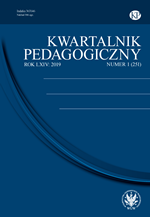Sieci współpracy i samokształcenia nauczycieli – pozory zmiany czy przestrzeń możliwości rozwoju kultury szkoły i jej uczestników
Networks of cooperation and teachers’ self-education – the appearance of change or space for opportunities to develop the school culture and its participants
Author(s): Ewa Maria FilipiakSubject(s): Social Sciences, Education
Published by: Wydawnictwa Uniwersytetu Warszawskiego
Keywords: learning in the zone of proximal development; transformative learning; learning by expanding; networks of learning professionals; collective teacher’s professionalism; strategies and tools for learnin
Summary/Abstract: Setting up cooperation and teachers’ self-education networking has been determined by a top-down regulation of the Minister of Education. It seems that in the course of implementation activities, legislative and administrative interventions related to this recommendation, one has lost the thinking of the nature and special characteristics of this type of learning and knowledge. The article analyses the special features of the collective learning process, and presents the fundamental theories constituting the interpretive and paradigmatic framework for the learning interpreted in such a way: Lev S.Vygotski’s cultural-historical theory, Jerome S. Bruner’s socio-cultural theory, Yrjö Engeström’s expansive learning theory and learning by expanding, Jack Mezirow’s transformative learning, Etienne Wenger’s situated learning theory and Jean Lave and Etienne Wenger’s community of practice concept, a participant of “teaching conversation”, the specific tools and strategies necessary to equip the cognitive box with teachers’ tools, have been selected and characterised. An example of a network of learning professionals is shown. In conclusion, one highlights the apparent activities of the created networks, projecting a certain understanding and instrumental understanding of the practice on practitioners, which hinders Bruner’’s challenge of transforming the school into a culture of learning communities.
Journal: Kwartalnik Pedagogiczny
- Issue Year: 251/2019
- Issue No: 1
- Page Range: 33-46
- Page Count: 14
- Language: Polish
- Content File-PDF

